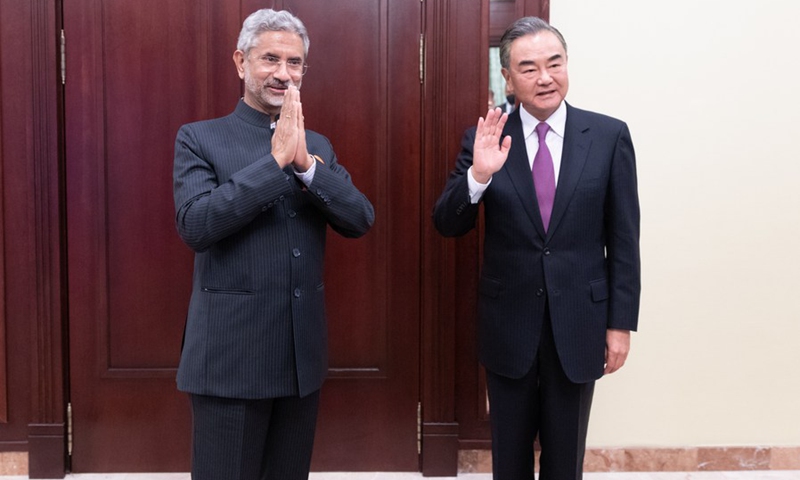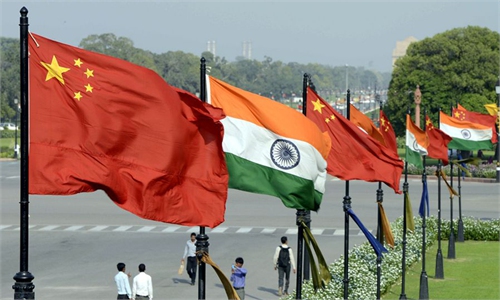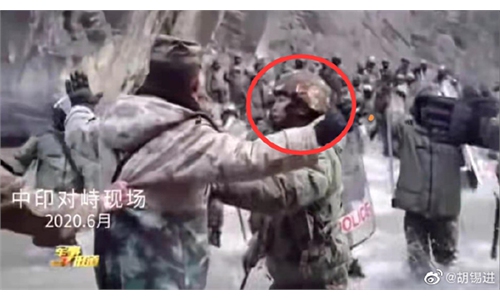Phone call between Indian, Chinese foreign ministers signals end of confrontation, shows determination to rebuild bilateral ties: Indian insider

Chinese State Councilor and Foreign Minister Wang Yi (R) meets with Indian External Affairs Minister Subrahmanyam Jaishankar on the sidelines of a meeting of the Shanghai Cooperation Organization Council of Foreign Ministers in Moscow, Russia, on Sept. 10, 2020. (Photo: Xinhua)
Chinese State Councilor and Foreign Minister Wang Yi talked with Indian Minister of External Affairs Subrahmanyam Jaishankar over the phone on Thursday, six days after the two countries held the tenth round of corps commander-level talks, in which the two countries had an in-depth exchange of views on issues along the Line of Actual Control (LAC) in the Western Sector, and agreed to follow the consensus reached by their state leaders.
An insider in India told Global Times that Indian and Chinese foreign ministers chose this time to hold talks in order to send an important message. He said that after the completion of the India-China disengagement on the northern and southern sides of the Pangong Lake, The two sides immediately held the 10th round of ministerial talks and agreed to submit their respective plans for the next stage of disengagement to the policy-making level. This indicate that this round of border confrontation has come to an end.
In this context, the phone call is the political continuation of the meeting between the two foreign ministers in Moscow in September 2020. This also demonstrates the efforts and determination of both sides to restore peace and tranquility in the border areas and rebuild mutual trust in bilateral relations.
The insider believes that although there are still differences between India and China on the border issue, both sides agree to "not letting the differences become serious disputes," which is the basis and key for a continued development of bilateral relations.
Experts reached by the Global Times said on Friday that the dialogue between Wang and Jaishankar was aimed at ensuring the full implementation of the consensus reached at the tenth round of talks.
According to the information released by the Chinese Foreign Ministry, Wang stressed that China and India must cherish the hard-won situation, maintain the momentum of consultation, improve the border control mechanisms, and advance the border negotiation process, to realize peace and tranquility along border areas.
Jaishankar noted that India hopes to strengthen dialogue with China to achieve complete disengagement in other regions as soon as possible, pushing forward a sustained cool-off in the border situation, according to the Chinese Foreign Ministry.
Although it is not clear who initiated the call, it is obvious that both sides want to move forward with the process of disengagement and peace along the border, Zhao Gancheng, director of the Center for Asia-Pacific Studies at the Shanghai Institute for International Studies, told the Global Times on Friday.
Zhao disclosed that the tenth round talks involved the settlement of the area where the months-long standoff first broke out, the Galwan Valley. What's more, disengagement at the three points of contact is an acceptable consensus for both sides.
"In the past 10 rounds of talks, there have been difficulties in the process of implementing the consensus, which shows that the two sides were quite far apart on the border issues in practice," Zhao said.
The latest phone call shows that, with mutual trust between the two sides hurt, the key decision-makers from the two countries are working hard to heal China-India relations and seek more progress, looking to possibly realize stability and development, Qian Feng, director of the research department at the National Strategy Institute at Tsinghua University, told the Global Times on Friday.
During the phone call, Wang and Jaishankar also agreed to establish a communication hotline to exchange views on certain matters. For experts, ensuring the mechanism works in a timely manner will be challenging for both sides.
Both Chinese and Indian commanders on the ground, even at the higher level, will have access to the hotline mechanism, which has played a role during many border frictions in the past, Zhao said. However, the case involving the Galwan Valley caused causalities and a great wave of hostility, resulting in the hotline being abandoned.
"When border frictions erupt, it is easy to turn to a game of mutual blame. The side who calls the hotline first will be regarded as the weak party, so no one is willing to call first," Zhao said, noting that soothing mechanisms on both sides also needs to play a bigger role and the demarcation of the LAC is fundamental to solving the dispute.
One analyst said that it is the common responsibility of both sides to maintain peace and tranquility on the border. Foreign Minister Wang Yi said on Thursday that rights and wrongs of the China-India border issue are very clear, and the recent wobble in India's China policy has led to a setback in relations between the two countries.
Observers noted that China has shown full goodwill recently in both delaying the announcement of martyrs in the border clash and backing India's hosting of the BRICS summit. And the two countries should take the summit as a chance to repair mutual trust and get back to the right path.
India holds the rotating chairmanship of BRICS in 2021, and will hold the BRICS summit in the second half of the year. China will host the Winter Olympics in Beijing in February 2022.
The two events will provide more opportunities for the two sides to ease relations, as leaders from both sides will possibly join the events if the COVID-19 pandemic is well under control, Zhao noted.
Observers said that some Indian media and netizens kept hyping up China's casualties, but the Indian government and military did not overreact or display a hard-line attitude toward China.
"They [Indian authorities] maintained a pragmatic and rational attitude, which also shows that the Indian government and military also value the opportunity to restore relations after a smooth completion of disengagement of frontline troops from the Pangong Lake area, with the border standoff coming to an end," Qian said.
Zhao, who previously held several exchanges with Jaishankar, told Global Times that the Indian foreign minister is neither pro-China nor anti-China.
"Jaishankar is very practical and realistic… He told me personally that before he became ambassador to China, he had read all the files of the Indian Ministry of External Affairs on the China-India border issue five times," Zhao said.
Jaishankar held the post of Indian Ambassador to China from 2013 to 2015. Bilateral trade between China and India totaled $77.7 billion in 2020. Replacing the US, China became India's largest trading partner in 2020, Bloomberg reported, citing Indian official data.




